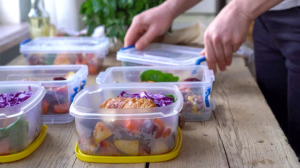Table of Contents
Think of any other form of addiction you know. Similarly, you can get addicted to food, and it’s hard to control your eating behavior. For most people, this issue is mainly around fast food addiction.
As if that’s not enough, many more people can’t do without refined sugars on most or all their meals. You start with a breakfast full of sugars and wind the day with a soda. Though this addiction issue is relatively new, it’s one that continues to affect millions across the country.
Furthermore, it’s responsible for the high cases of obesity starting from young children to the elderly. But, how can you overcome it and live a healthier and more fulfilling life? Can you use essential CBD to help with withdrawal?
You May Also Like: 5 Tips to Help Your Teen Eat Healthy
Start by asking yourself, what is food addiction?
Defining Food Addiction
How to overcome food addiction? It is a matter many people grapple with such a situation. Once you notice the problem, the next step is solving it. But, what is this addiction in the first place?
Imagine what it would be like not to be able to resist certain types of foods. For example, all your meals are fast meals and sugary soft drinks. Most people addicted to foods indulge heavily in this junk that adds no value to the body.
Check this out. You buy a box of sodas to keep in the fridge for a month or so. But you end up finishing all of it in two days. Yet if your friend does the same, the sodas are there a month later.
But, when it comes to eating healthy foods like fruits and vegetables, they can stay in your fridge for months. You’ve no desire to eat them but only turn to junk foods. The truth is that not many people can binge on healthy foods, but an addict eats it all in one sitting.
If that’s the case, then you suffer from this addiction. In other words, eating these types of foods satisfies your brain’s need for a reward. Even when you intend to have a small amount, you wind up binging and wanting more.
At this point, eating gives you the same high as drugs or alcohol. That’s right, now is the time to find out how to deal with food addiction. Unfortunately, many addicts abuse processed, fatty, and sugary food, which only add weight and no nutrients to the body.
The effect you end up feeling once you eat these foods as an addict is similar to your brain’s dopamine effect. So what are the symptoms to watch out for that signify you suffer from food addiction?
Symptoms of Food Addiction
Constant Cravings
Even after you eat and are full, you now crave certain snacks like crisps and sodas. After you take them, in no time at all, you want something else. It’s never enough as your brain convinces you to eat more and more.
Food Obsession
You become obsessed with specific meals like ice cream or fries and can never have enough. It gets hard to go a whole day without eating or drinking it.
Eating until stuffed
At times, you feel yourself getting full but can’t stop eating the items. It’s hard to control yourself and keep it to eat later.
Not eating healthy meals
Think of the last time you had a whole meal of only healthy foods without wheat, processed, or refined foods. How to cure food addiction starts with taking stock of what you eat every day.
Being unable to quit certain foods
How many diets have you started but never seen through to stop eating junk foods? Being a food addict makes it hard to stick to a diet and avoid certain foods.
Moments of Guilt
Do you feel guilty after binging on certain items? Still, even after feeling the guilt, you go ahead and eat it again.
To combat food addiction, you must start by acknowledging you have a problem. Only after that can you get help and solve the situation. Though the term refers to many things, this is a condition that you shouldn’t take lightly.
How to Diagnose Food Addiction
There’s a food addiction 12-step program that comes in handy when diagnosing this condition. These include:
- Taking food in larger quantities than is necessary and for longer durations.
- Not being able to quit, no matter how many times you try.
- Seeking and searching for something to eat becomes a top priority in life.
- The desire to gather with others or attend social events reduces over time.
- Keep on using even when the food affects your health and well-being.
- Lack of tolerance.
- Suffer from withdrawal symptoms when you try to quit certain types of eating items.
- Even when this condition affects your relationships, you can’t stop eating.
- Poor productivity as everything else becomes unimportant apart from food
- Eating in hazardous places without considering safety.
- Strong cravings resulting in uncontrollable behavior.
- Physical health impairment.
When diagnosing this addiction, you must meet two or more of these criteria. Once you have a proper diagnosis, then you start the journey to recovery. But that’s not all. You must take specific steps to ensure your recovery failure, to which you will wind up in the same place you started.
Start by attending food addiction meetings in your area. These are safe places where you can face the issues that affect your life, leading to the condition. There’s also food addiction therapy, and you can check yourself into rehab for severe cases.
Food Addiction Statistics to Note
Across the country, there are more than 65 million adults addicted to certain foods. The number is growing as more people opt to eat unhealthy snacks rather than healthy ones.
Final Point
Being addicted to eating is a health issue that you must address before it gets out of hand. So what can you do about it? For one, you can attend meetings and therapy to help you start the recovery journey. There are also food addiction help numbers you can call.
Let us know if you have any questions or additional information by leaving a comment below.






